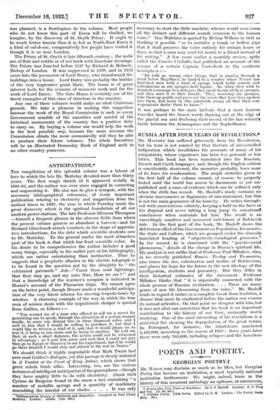RUSSIA AFTER FOUR YEARS OF REVOLUTION.* MR. MASLOFF has suffered
grievously from the Revolution, but his tone is not marred by that rhetoric of uncontrolled indignation which invalidates the accounts of many of his compatriots, whose experience has been less personal or less bitter. This book has been translated into the Russian, French and Czech languages, and, though the English edition is considerably shortened, the narrative probably loses none of its force for condensation. The ample statistics given in the first half of the volume cannot, of course, be properly tested until the world has access to documents as yet un- published and a mass of evidence which can be collated only when the strife has ceased. Mr. Masloff's study contains no obvious inaccuracies or flagrancies of mis-statement, but this is not the main guarantee of his honesty. He writes through- out with conscientious sobriety, keeping a hold on the facts at his disposal and never taking a long jump to sensational conclusions when materials fail him. The result is an exceedingly sensitive and measured indictment of Bolshevik rule. In the first part of the book, Mr. Masloff shows the deleterious effect of the Government on Population, Economics, the State and Culture, which are grouped under the clumsily translated heading of "objectively-sociological process'es." In the second, he is concerned with the "psycho-social phenomena," details of the change in Russia's spiritual life. His analysis is not unlike that of Professor Paul Miliukov, who, in his recently published Russia—To-day and To-morrow, also traces the rise, culmination and decline of Bolshevism, and places his hope for the future in the new ideology of the intelligentsia, students and peasantry. But they differ in their historical estimates of the movement. Professor Miliukov thinks that "it is organically .connected with the whole process of Russian civilization. . . . There are many germs of new life blossoming from the ruins." Mr. Masloff tends to regard it rather as a complete break from tradition, a disease that must be eradicated before the nation can resume its normal activities. On that point we disagree with him, but it does not alter our conviction that his book is an important contribution to the history of our time, eminently worth studying. One of the most interesting of his revelations is a statistical list showing the depopulation of the great towns. In Petrograd, for instance, the inhabitants numbered 2,420,000, according to the census of 1917: three years later there were only 705,000, including refugees and the homeless.














































 Previous page
Previous page